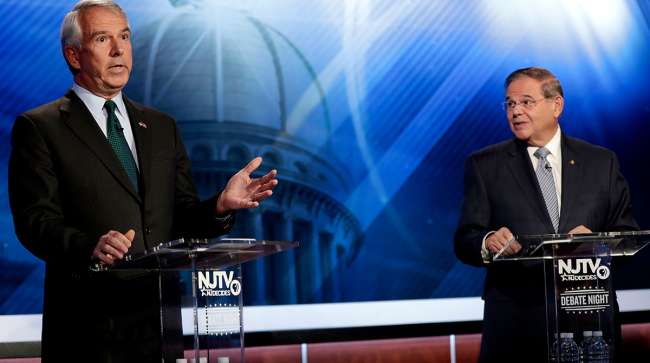Senior Reporter
New Jersey’s Sen. Robert Menendez, Bob Hugin Disagree on Infrastructure Funding

This November, if New Jersey voters elect Republican political novice Bob Hugin to the U.S. Senate, President Donald Trump’s chances of advancing an infrastructure funding agenda through Congress next year could improve.
Hugin, a former pharmaceutical executive self-funding an ambitious campaign to topple incumbent Sen. Robert Menendez (D), has said “creative solutions” should be sought for funding big-ticket infrastructure projects in the Garden State and around the country. The White House argued for a similar approach earlier this year.
When the candidates faced off on Oct. 24 in Newark, N.J., Hugin emphasized infrastructure funding would be a priority if he is elected and he questioned the senator’s leadership on the issue.
“Every time you hit a pothole or your New Jersey train is canceled — the transit train is canceled — remember, Sen. Menendez has been representing you in Washington for 25 years,” Hugin said. “Washington has failed us on infrastructure in both Democratic and Republican administrations.”
Menendez, meanwhile, criticized the Trump administration for denying funds for the state’s multimodal system, primarily a multi-part rail tunnel project at the Hudson River known as Gateway, which is designed to improve connectivity with New York City.
“This president has opposed us every step of the way,” said the senator.
New Jersey is a major corridor for trucks traveling in the Northeast and is home to large ports, airports, freight and passenger rail connecting commerce and commuters. Both candidates support the Gateway project and pledge on their campaign websites to increase funding for state-centric projects.
For instance, Hugin said he would ensure “federal tax dollars are invested here to modernize our infrastructure, which will improve our economy, make our roads, bridges and tunnels safer, and create good-paying, high-skill jobs.”
Menendez indicated he would push for “investments in infrastructure to put construction workers back to work.”
Neither candidate returned requests seeking comment by press time.
In February, the White House unveiled a 10-year, $1.5 trillion proposal that would significantly rely on public, private partnerships to fund projects. The proposal failed to capture Congress’ enthusiasm, prompting the White House to drop it as a legislative priority this year. Republican transportation leaders on Capitol Hill told Transport Topics the president intends to push infrastructure policy next year. Traditionally, infrastructure projects have been backed primarily by revenue from fuel taxes.
Menendez, elected to the Senate in 2006 and who at one point was responsible for his colleagues’ reelection efforts as chairman of the Democratic Senatorial Campaign Committee, panned Trump’s infrastructure pitch soon after it had been announced.
“Shifting the federal responsibility for infrastructure to local communities doesn’t solve the problem,” Menendez said on Feb. 16, at an event broadcast by NJTV News. “So this plan is absolutely insane when it comes to actually dealing with the nation’s infrastructure.”
Hugin told Bloomberg News this summer, “Infrastructure is one of the most important things in New Jersey. You don’t have to be in New Jersey very long to see the congestion. It affects quality of life. We need to improve infrastructure. We need creative solutions — public, private partnerships — but also we need Washington to invest more in New Jersey. New Jersey has been the centerpiece of our economy in our country.”

Jenkins
A former chairman of New Jersey-based pharmaceutical company Celgene, Hugin is in a statistical tie with Menendez, according to a Fairleigh Dickinson University poll published this month. “There’s no denying that this is tighter than one would expect for an incumbent senator,” Krista Jenkins, a politics professor at Fairleigh Dickinson University and the poll’s director, said. The Cook Political Report, meanwhile, indicated the contest leans in favor of the Democrats.
Part of Hugin’s appeal, election analysts argue, could be the result of Menendez’s recent legal troubles. The senator was in the national spotlight amid bribery charges, and his federal corruption trial ended in a mistrial in 2017. Hugin’s television ads draw attention to the senator’s court battles. Menendez’s campaign paints Hugin as a greedy executive aligned with Trump.
If elected, Hugin, who supported Trump and met him at the White House when he was the chairman of Celgene, would become the first Republican that a majority of New Jerseyans send to the Senate since the early 1970s.
Federal Election Commission records show that from Jan. 1, 2017 through Sept. 30, Hugin had raised $26.2 million, of which more than half came from him.

Toth
Menendez had raised $10.9 million, FEC records showed. And, according to the Center for Responsive Politics, in the current election cycle, Menendez received nearly $74,000 from the transportation sector. Lawyers and law firms were his top contributors at $1.1 million.
Menendez is ranking member of the subcommittee on Housing, Transportation, and Community Development, which has jurisdiction over transit systems. He also sits on the Finance Committee, with jurisdiction over the Highway Trust Fund that relies on diminishing revenue from the 24.4-cent-per-gallon diesel tax and 18.4-cent-per-gallon gas tax.
Gail Toth, executive director of the New Jersey Motor Truck Association, told TT concerns with independent contractors, traffic congestion and connectivity at the ports are priorities for the industry.




